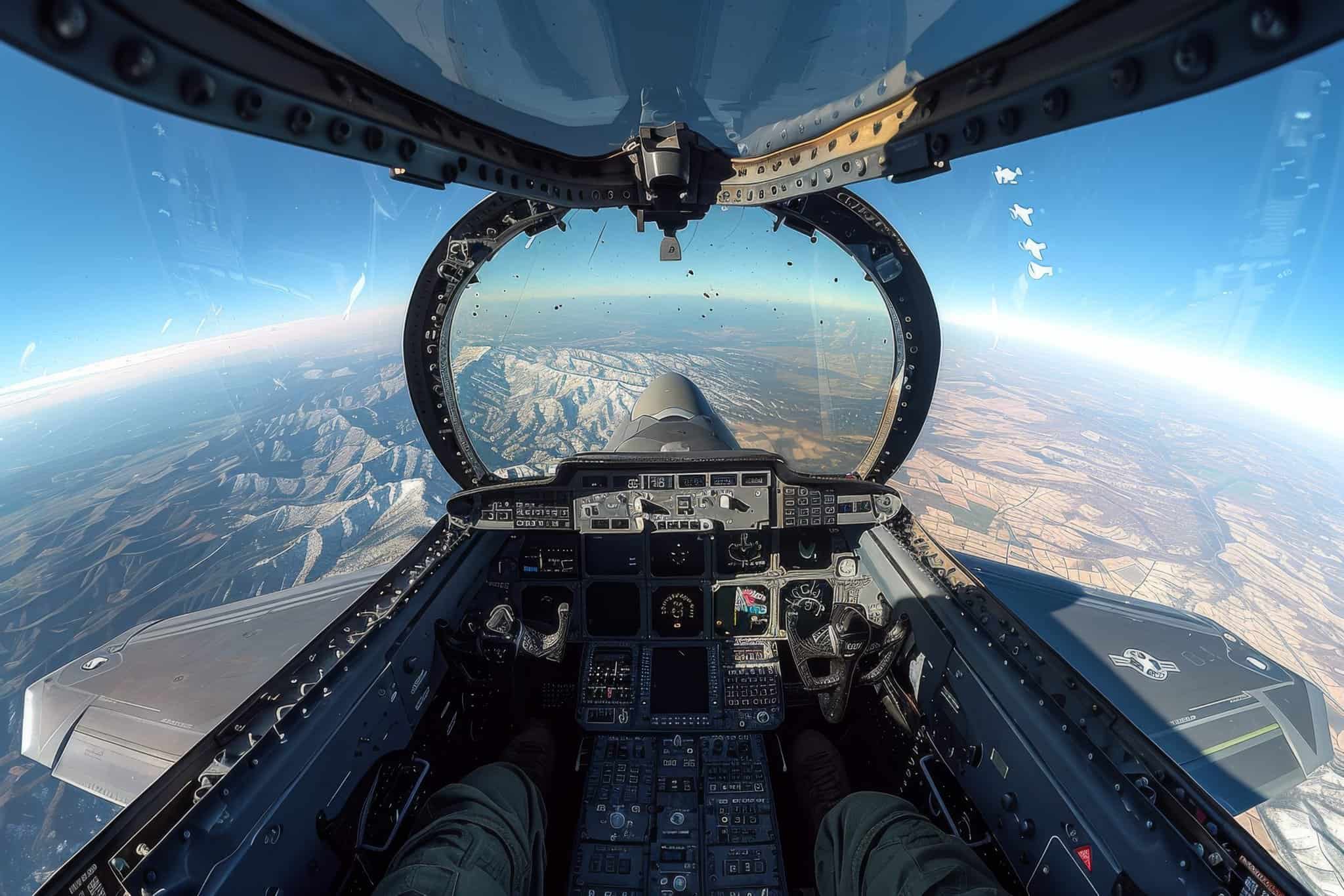The F-22 Raptor is often hailed as one of the most advanced fighter jets in the world, and a significant part of its superiority lies within its highly sophisticated cockpit. This advanced fighter, designed by Lockheed Martin, integrates cutting-edge technology that allows it to maintain air dominance while also evading enemy radar detection. To understand just how formidable the Raptor is, one must look closely at what it offers to its pilot from within this ultra-modern cockpit.
Inside the cockpit, the F-22 incorporates a glass cockpit design that replaces traditional analog gauges with digital displays. This transition enhances the pilot’s situational awareness by providing a vast array of mission-critical information in real time. The primary flight display (PFD) showcases key flight parameters, while a multi-functional display (MFD) allows the pilot to access tactical data, navigation information, and sensor feeds. The arrangement of these displays is carefully considered to minimise the time the pilot spends focusing on instrumentation and maximise the time they can focus on flying and combat.
One of the standout features of the F-22’s cockpit is its highly sophisticated avionics system. This includes the AN/ALR-94 radar warning receiver and the AN/APG-77 radar system, which give the pilot unprecedented awareness of their environment. The radar system enables the Raptor to detect, track, and engage targets from long distances, making it a lethal adversary in aerial combat. The integrated avionics network connects the various systems, allowing for seamless functionality and information sharing between sensors and displays that enhances decision-making capability in combat situations.
The cockpit is also designed with operation ease in mind, featuring a side-stick control instead of a traditional control yoke. This design not only allows for greater manoeuvrability of the aircraft but also provides a more comfortable interface for the pilot, reducing fatigue during prolonged missions. Along with a heads-up display (HUD) that projects vital flight information directly in the pilot’s line of sight, the cockpit is tailored for high-performance flying.
Stealth technology is another key aspect that influences the pilot’s experience inside the F-22. The jet’s design, including its cockpit, emphasises a low observable profile, minimising its radar cross-section. This allows pilots to operate in hostile airspaces without being easily detected, a critical advantage in modern warfare. The Raptor’s ability to remain undetected while engaging enemy targets with precision is a testament to its cutting-edge design and engineering.
Furthermore, the cockpit is equipped with advanced communication systems, allowing for secure and rapid communication with other aircraft and command centres. This connectivity is crucial for coordinating missions and integrating with other platforms, highlighting the F-22’s role as a force multiplier in joint operations.
The pilot’s seat in the F-22 cockpit is equipped with an ejection seat designed for safety, featuring an advanced mechanism that ensures safe ejection at various altitudes and speeds. Safety and ergonomics have been a priority in the cockpit’s design, allowing pilots to execute complex manoeuvres while staying focused on the mission.
In conclusion, the cockpit of the F-22 Raptor stands as a prime example of modern aerospace engineering, integrating cutting-edge technology with user-centric design. The features within this invisible warrior not only enhance the combat effectiveness of the aircraft but also ensure that pilots can operate it safely and efficiently in the most demanding environments. The F-22 Raptor is not just a product of advanced technology; it is a testament to how that technology has been harnessed to redefine air superiority in the 21st century.
F-22 Raptor: Tips, Life Hacks, and Interesting Facts
The F-22 Raptor is more than just a remarkable piece of military engineering; it offers fascinating insights into the world of aviation technology and pilot experience. Here are some tips, life hacks, and intriguing facts related to this highly advanced fighter jet.
1. Understanding Situational Awareness
One of the greatest advantages of flying, especially in a complex environment like modern aerial combat, is situational awareness. The F-22’s glass cockpit significantly enhances this by displaying essential flight and tactical information in real-time. Aspiring pilots can benefit from simulator training that focuses on improving situational awareness by utilising modern cockpit designs.
2. Digital vs. Analog
The shift from analog to digital displays in aviation reflects a broader trend in technology. For those interested in aviation or flight simulation, investing time in learning about digital instrumentation can provide valuable benefits. Familiarise yourself with how to read and interpret digital gauges because they are predominant in modern aircraft, similar to the F-22.
3. The Importance of Ergonomics
The design of the F-22 cockpit takes pilot comfort into account to reduce fatigue during long missions. Pilots can apply this principle of ergonomics to any intense activity—whether in sports or gaming—by ensuring that their equipment is comfortable and tailored to their movements. Choosing the right chair and setup can minimise fatigue significantly.
4. Stealth Technology: A Game Changer
The F-22’s stealth characteristics allow it to operate undetected. Understanding the principles of stealth technology can enhance your knowledge of both military tactics and the engineering behind today’s aircraft. For hobbyists, exploring the basics of radar cross-section reduction can provide insights into DIY projects aimed at optimising electronics and signals.
5. Communication and Coordination
The F-22 is equipped with advanced communication systems to ensure secure connections with other aircraft. In team-based environments, whether in a work setting or a sporting event, maintaining clear communication and using technology for coordination can lead to significantly better team performance.
6. Safety First: Ejection Seats
The ejection seat technology in the F-22 is state-of-the-art, designed for maximum safety. This serves as a reminder that safety innovations from the aviation industry often transfer to everyday life. Consider how emergency egress techniques, like the three-point escape approach used in aircraft, can translate into practices to ensure quick evacuation paths in your own home or workspace.
7. Learning from the Best
The F-22 is a testament to how engineering and technology can combine creatively to create a superior product. If you’re interested in engineering or design, studying aerospace principles and innovations can inspire solutions in various fields. There are numerous resources out there, including online courses that cover aerospace engineering concepts that are applicable in many industries.
In conclusion, the cockpit of the F-22 Raptor serves as a prime example of what is possible in aircraft design and pilot ergonomics. Whether you are an aviation enthusiast, a budding pilot, or simply interested in technology, the features and insights derived from the F-22 can inspire many practical applications in everyday life. For more fascinating insights into aviation and technology exploration, visit Lockheed Martin for resources and updates.







